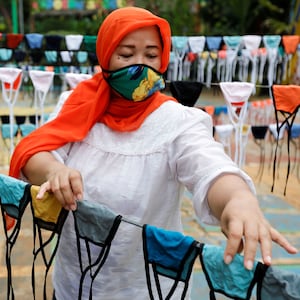Scientists are racing to develop a vaccine for the novel coronavirus, and anti-vaxxers are waiting in the wings.
COVID-19, the disease caused by the virus, is killing hundreds of Americans every day. So it was reason for optimism on Monday when Inovio Pharmaceuticals became the second U.S company to move a vaccine candidate into clinical trials, following Moderna, a biotech company which started clinical trials in mid-March.
"Getting [Moderna’s candidate] into phase one in a matter of months is the quickest that anyone has ever done literally in the history of vaccinology,” Dr. Anthony Fauci, director of the National Institute of Allergy and Infectious Diseases, testified before Congress last month.
Naturally, the global movement of vaccine opponents and skeptics—who organize under banners of “choice” and “informed consent”—reacted differently. In recent weeks, they’ve been raising the alarm over expedited development. Larry Cook, one of the top anti-vaccine activists on Facebook, has called COVID-19 a “plandemic” that governments are using to “usher in mandatory testing, tracking, and vaccination.” #ResistThePlan, he’s urged his followers.
Activists like Cook have amassed considerable political power over the last several decades, and scientists say their propaganda is a major reason the U.S. has seen a recent resurgence of measles. In 2019, the World Health Organization ranked “vaccine hesitancy” as one of the top 10 global health threats, and earlier this year Gallup found 84 percent of Americans said it was important for parents to vaccinate their children, down from 94 percent in 2001.
Dr. Fauci has said a vaccine could be ready for public distribution in the next year and a half or less, though the estimate may prove too optimistic. Typically vaccine clinical trials take 10 to 15 years, and require a significantly higher safety bar to clear than other drugs, since vaccines are injected into healthy people.
Urgent as the need is, public health leaders warn, moving too quickly could have disastrous consequences not only for reining in COVID-19, but for vaccines more broadly. If a vaccine is released that doesn’t work well or yields dangerous side effects—especially in the face of an historic pandemic—it could empower anti-vaccine activists and reduce support for other longstanding vaccines that have gone through rigorous and exhaustive testing.
“There have been times in the past where vaccines have been justifiably rolled out and they haven’t measured up,” said Dr. William Schaffner, a professor of preventive medicine and infectious diseases at Vanderbilt’s School of Medicine. “And that set vaccinology, vaccine acceptance, and confidence in government way back.”
Not exactly assuaging concerns is the fact that the Trump administration has dramatically reduced the role of science in federal policymaking over the last three years. The president holds a lot of power to waive various safety standards, and by invoking the Food and Drug Administration’s so-called Emergency Use Authorization, “the federal government has an incredible amount of latitude to accelerate the regulatory review,” according to Dr. Jason Schwartz, an assistant professor at the Yale School of Public Health who studies vaccine development.
Finding ways to hasten the process is a stated priority of the president, though Dr. Schaffner said that was not inherently a worrying thing. “Speeding things up does not mean cutting corners. You can try to run the quarter-mile faster,” he told The Daily Beast. “There are ways to do that, some of which are scientific, and some of which are simply expensive.”
Schwartz added that while “there can be interference and political intrusions in the scientific process” the day-to-day work is still being handled by “long-serving, dedicated career public servants” who believe in “evidence and rigor.”
Suffice it to say vaccine holdouts aren’t buying it.
Del Bigtree, CEO of the anti-vaccination group Informed Consent Action Network, told The Daily Beast he had grave concerns about the coronavirus vaccine process. “It’s one of the most dangerous things we can think of, injecting people with products where the science was rushed,” he said. Bigtree, who has no medical training, said if a vaccine proves safe, then it should be “made available” to high-risk individuals, but that everyone else should be permitted to “develop natural, stronger, more thorough herd immunity” to coronavirus without a vaccine.
The idea behind herd immunity is that people will develop broad protection thanks to inoculation or past infection in a critical threshold of the population. Perhaps most infamously, the government of British Prime Minister Boris Johnson appeared to embrace such hopes of immunizing people by allowing them to get infected with COVID-19. It’s a goal the government has since retracted, and Johnson later landed in the ICU with a coronavirus case himself, though he has since shown signs of recovery.
A spokesperson for another anti-vaccine group, the Pennsylvania Coalition for Informed Consent, pointed to Dr. Paul Offit, co-inventor of the rotavirus vaccine and a prominent critic of anti-vaxxers. Offit, who supports the development of a COVID-19 vaccine, has warned about moving too quickly. “The history of medicine is littered with tragedy,” he said in a recent interview. “I don’t think [it’s] going to happen, but I do think we need to prove that it doesn’t happen before we give this vaccine to tens of millions, or hundreds of millions.” Ideally, Offit said, a vaccine will be tested on tens of thousands of people before it is licensed.
According to a recent LX/Morning Consult poll, 75 percent of U.S adults said they’d likely get a coronavirus vaccine if it passed clinical trials. But whether that’s enough to provide herd immunity remains unclear. When it comes to measles, 90 to 95 percent of the population has to be vaccinated to guarantee sufficient protection, research has shown.
Elected officials have generally not yet weighed in on whether approved coronavirus vaccines should be mandatory. But any requirement to do so would surely be met with fights by the anti-vax crowd. In an interview, Denise, a volunteer with the Indiana Coalition for Vaccination Choice—who refused to give her last name because, she said, anti-vaxxers are attacked too much—promised resistance. She argued “best practices for medical care respect the inherent dignity and uniqueness of every individual.”
Best-case scenario, experts say, is a coronavirus vaccine is developed quickly, works well, is heavily promoted, and the anti-vax movement loses ground—reversing a decades-long trend. But that’s just one possibility.
As Dr. Schaffner of Vanderbilt summed it up bluntly: “The stakes really are high.”


